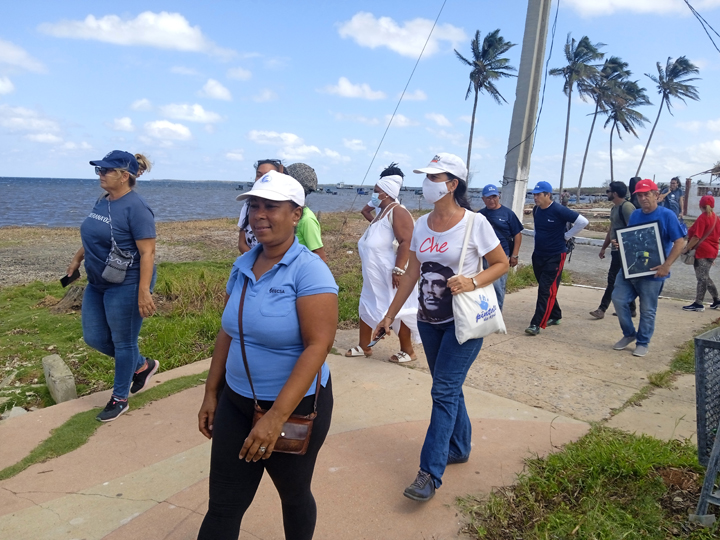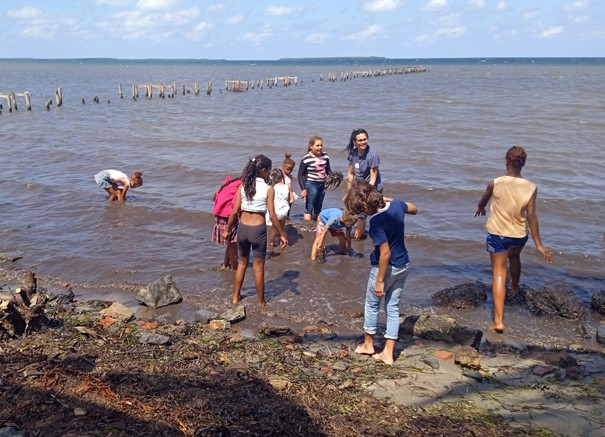A Port Well Named Esperanza
especiales

As soon as we got into the bus we took a photo and I posted it on my Facebook account: We're going to Puerto Esperanza, because #ACubaHayQueQuererla. Then I took a look around that parallel life and found "Eldiablo Díaz", who had arrived long before me, calling roll with a song by Silvio:
"A bordo de esta expedición/ va un loco, un albañil,/ un nigromante, un ruiseñor/ y un beso espadachín/ Nos falta un día, un niño, un don / para sobrevivir..."
So I thought of telling Fidel Díaz Castro, Fide, that we already had the child: my Javi, accompanied me to Puerto Esperanza. I didn’t know exactly how many we were or who we were, although just a peek at the familiar faces I knew that troubadours, journalists, intellectuals, ETECSA workers were on board, poets, diplomats, doctors, drivers, stemmatologists, a cartoonist and, the godmother of La Guinea, with all the ashes of Batali.
After that there was a stopover at the Finlay Vaccine Institute and another bus joined with a very special team: part of the scientists to whom we owe the vaccine against COVID-19, wearing blue pullovers that read Sobering, as if the efforts in the laboratory were not enough, they were there, on their way to Puerto Esperanza, "loving this country as they love themselves".

We came across the creators of Abdala, the other Cuban vaccine against COVID-19, the scientists of the Center for Genetic Engineering and Biotechnology (CIGB for its acronym in Spanish), working between the curves of the road to Viñales, that place that does not lose its beauty, but the fury of the hurricane hit it as with a seething envy. However, when I saw them greet each other through the bus windows, I confirmed that we are also going to pull through this one and that the percentage of effectiveness of our immunogens has a secret ingredient: they were made with infinite love for this island and its people.
The trip may have been a bit long for us, among other things because the road bordering the mountains of Viñales must always be taken with caution, but especially now, that the bus either gets tangled in a fallen cable or has to almost navigate a stretch and constantly share the narrow road with vehicles from the Electric Company, Etecsa and even with the ice cream truck.

We got straight to the beach. Puerto Esperanza has a wide street that leads right to it. The plan was to cooperate with the neighbors in cleaning the beach, as Enrique Ubieta wrote "the residents had not waited for us, for no one and they piled up seaweed tangled on the shore and we only helped in loading the piles on a wagon".
At least that's what most of us did, with a couple of exceptions: my Javi and a young girl from Finlay who took off their shoes and went into the water with the gang of kids who didn't tire of collecting even the last "tiny seaweed".

"At least the hurricane helped us with this, it removed all the trash from the beach," a boy from Puerto Esperanza told me how that had been with Ian. "Roofs on houses were blown and everything, it was hard, but look, it leaved the sand much cleaner." He was not naive, nor indolent, it was much clearer than the sea water he longed for, because this year, in the summer, it was impossible to take a dip due to the amount of seaweed washing ashore. My new little friend went back to work and my Javi with him, with them... That was my first lesson in that little fishing village: the future has to be, will be, better...

The work lasted until the wagon was full, not because we wanted to stop, but because the small artists of "La Camorra" sociocultural project, from Puerto Esperanza, were ready and willing to perform for us (notice the skills of those beautiful people to clean even the meaning of words, the town, the beach, even the soul).
From time to time, they shared the stage to troubadours and poets. They sang to Che and Fidel, to love, to the future... Before starting singing, the singer-songwriter Silvio Alejandro assured that he felt "very proud of Cuba, which is beginning to regenerate like this, with songs..." I’d dare assure you that everyone in that small room, felt the same.

La Guinera's godmother also gave her blessing to the families of Puerto Esperanza: "I see that you are a brave people, a people of daring and determined people, who are fighting for everything you want, you are defending your ideas, your illusions, your dreams. You are transmitting to the children that there’s no hurricane strong enough that can destroy our joy, that nothing can destroy us if we are all together. You are an example for Cuba. What you went through was devastating, but you are undergoing it with courage, with strength, they still continue to dedicate the best they have for us, which is their love. Thank you for receiving us and sharing with us. The only thing I can say to you is, ashé!"


Shortly before returning, the troubadour Ariel Díaz commented: "More than bringing a message, I came to take a message, because you have to learn a lot from these experiences, you know that what you do is not enough, but when you come and see the people, how they react, that even if it’s just symbolic, coming to share with people, that is something huge, because what must not prevail is abandonment and materials are not enough, nor can there be spiritual abandonment, we can’t wait for a disaster to happen to go to these places".


In fact, Raúl Torres, one of the leaders of “#ACubaHayQueQuererla" project, arrived just behind Ian in Puerto Esperanza, but it was not his first visit, his partner in this crusade of love for the country, Amado Riol, tells me, that "Raulito already had a relationship with "La Camorra", which is a cultural project, for children, very important in this place. He was romantically connected with Puerto Esperanza and we were the first to arrive here. They could not believe that we were here. So we told them that we came to bring hope, love, the confidence that they are not alone. Now we are fulfilling what we promised that we would return with help and, most importantly, that this help is from the people, from a lot of people who wanted to collaborate. Today is a special day, because it’s the day of the fall of Ché in Bolivia and I feel that by doing this we are complying with Ché and we are also complying with Fidel".

In the donation truck we drove into Puerto Esparanza there were contributions from neighbors and real and virtual friends who spread the word, from retirees, from children, including those of Gonzalo de Quesada primary school in the capital, from artists, workers from IPK institute, from the Institute of Neurology and Neurosurgery, Manuel Fajardo Hospital, Ameijeiras, the Ministry of Justice, the Stomatology Clinic of H and 21, Encomed, the Finlay Institute of Vaccines, the Molecular Immunology Center, MITRANS, ETECSA, from Varadero came hurriedly a young woman the afternoon before the trip to bring the collaboration of her co-workers, definitely love intertwines infinite networks, even in these times where hate does everything to win us over, this is a land of people who love.
That was the main reason and the first delivery of Raúl Torres: "... I brought an already overflowing love, messages of solidarity from millions of Cubans who wanted to share with the victims as we have done in project #ACubaHayQueQuererla. We have brought the necessary encouragement to revive hope in that damaged village by the hurricane and we have brought with us the gratitude of those faces convinced that our Revolution will never abandon its people. Pinar is already rising from the ashes, it shakes the dust from the road and begins to walk, little by little, but already walking".

Meanwhile, Adán, a cartoonist for Juventud Rebelde newspaper, had endlessly drawn the faces of boys and girls entering the porch of Casa de Actividades. This place is very close to the beach, just a few meters away, I didn't even know what to call it, house of culture, theater, but they made it clear to me that it was called House of Activities, the girls I befriended there I don't know what to call the people from Puerto Esperanza, I googled it and discovered that there is another town in Argentina, in Ché's homeland, those from there are "Esperanceños", those from here, without a doubt, are hopeful. We intended to take it as a gift and it turned out that they were the owners, hope is not just the name of the town, it’s its realm.
Translated by Amilkal Labañino / CubaSí Translation Staff














Add new comment